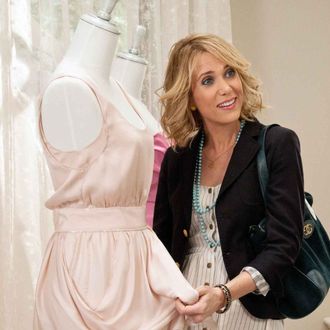
A weeklong series dedicated to skewering the traditions, expectations, and psychodrama that surround wedding season.
In the summer of 2015, I went to seven weddings in five months, and I’ve never spent more money in such a short period of time. I started out with good intentions and naïve optimism: I was an adult with a decent job, Delta SkyMiles, and dental insurance, dammit. I’d make it work! Then I burned through my “budget” (whatever that was — honestly, I can’t even remember), then my savings (same) with frightening speed. My money’s exodus was visceral, like dollar bills were trampling each other to flee my bank account.
To cope, I deployed my favorite psychological tactic — avoidance — and stopped looking at my credit-card balance. (You can probably guess how that went.) But if you’re facing a summer full of nuptials and a limited bank account, I recommend that you take a more strategic approach.
Just say no.
If there’s one thing I learned from the Summer of Weddings, it’s that turning down an invitation is actually quite easy, even for conflict-averse people like me: You just check off the “regrets” box and say, sorry, you wish you could be there, and thank you. If you really care, send a thoughtful note, and maybe throw in a small gift for bonus points.
The tougher part is figuring out which weddings to cull from your list. “When you get an invitation, that’s what it is — an invitation — not an obligation,” says Meg Keene, the founder of A Practical Wedding. “It’s an offer, and nothing more. Think of it from the other way around: No one wants to feel like their wedding is an imposition, and that only works if they recognize that the people they invite are grown-ups who are allowed to say no.”
If you’re still hemming and hawing, it can be helpful to plot things out on paper. Use whatever system you prefer, but I suggest rating each wedding on a scale of one to ten on cost (including travel and lodging), your closeness to the people getting married, and how fun it will be (where it is, and who else is going), and then compare the numbers and pick your cutoff sum. Cold? Yeah, but if weddings are the epitome of emotional spending, then any means of objectivity is your friend.
One thing to avoid: excuses. “Any reason you give for not being at someone’s wedding could make the couple feel worse,” says Keene. “If you mention finances, it comes across as, ‘I’d love to be there, but it’s just not my financial priority this year,’ and that’s shitty.” Meanwhile, perfect the art of the gracious white lie. “You never have to tell people the whole truth,” she adds. “Chances are, they don’t even want to hear it. No one has to know you were in your hotel room watching TV during the rehearsal dinner because you were tired. Just be polite and don’t make anyone chase you down for an RSVP.”
If you have to travel, buddy up.
My favorite weddings are the ones I can take the subway to. But most of them involve car trips, Uber rides, and $110 hotel rooms with spackled walls and broken hair dryers. When this is the case, find people to bunk up and carpool with you. If you don’t know anyone, Keene recommends asking the couple getting married to hook you up with any other friends who might be down for sharing (and check local Airbnb listings while you’re at it). Chances are, you won’t be their only wedding guest looking to save a few hundred bucks.
No one cares what you wear.
I know: If you wear the same outfit twice then everyone will be able to tell in “the pictures.” But if that outfit looks good, then who cares? My advice: Get two or three dresses that you like (hopefully you already own at least one), and then repeat them shamelessly. No bride is going to realize — let alone be remotely miffed — that you’ve shown up in the same thing you wore two weekends ago, as long as it isn’t white and doesn’t upstage her. Personally, I wore a blue striped dress to so many summer weddings over the past five years that it literally fell apart. (“Finally,” said my husband, who was the only one who ever noticed.)
A word on rentals: If there’s a wedding with a very particular or formal dress code, renting a dress might be the way to go, although it still isn’t exactly cheap. Most rental dresses start at about $65 (and can be much more expensive), so from a price-per-wear perspective, that’s high — although still better than purchasing something you’ll never wear again. Alternatively, if your weddings are clustered close together (and involve additional dressy events like rehearsal dinners and the like), Rent the Runway has an intriguing-looking “unlimited” option, which costs $139 per month and allows you an endless amount of three items at once (better yet, it can be cancelled at any time). I’ve never used it myself, but if I were to relive the Summer of Weddings, I’d probably give it a whirl.
Don’t pay anyone to do your hair.
If all your wealthier friends want to go get blowouts together, go drink mimosas with them while they do so — I’ve done that — but honestly, you’ll wind up with a sweaty ponytail by the end of the night anyway, so don’t bother. There, you’ve just saved $50.
As for makeup and other beauty treatments: There is no reason to deviate from your regular routine. Sure, there will be photographers hanging around, but their job is to make you look good, not vice versa. Also, you are not the main event. Just think — the more normal you look, the more spectacular the bride looks by comparison. You’re doing her a favor by not trying too hard, really.
Gifts are optional, and you have all year to buy them.
Wedding etiquette dictates that you have a year to send a gift — if you want to send one at all. I love this rule because it allows you to scope out how much the couple seems to care about the presents they receive. If they’re all, “We didn’t even want anything, and now we have to store all this crap somewhere,” then you can get them something small, or just write a heartfelt letter. But if they grouch about someone giving them stingy Tupperware, then you’d better pony up. Keene says she usually aims for the six-month mark. “It can be a nice surprise to get a gift after all the hustle and bustle is over,” she says.
According to a spokesperson at online wedding registry Zola, the average gift purchase on their website is about $100, so you can use that as a baseline. Some people suggest making a gift if you’re crafty, but unless you know the couple extremely well or are a professional artisan of some kind, that seems … risky.
Beware sneaky, last-minute costs.
When Bari Tessler, a financial therapist and founder of The Art of Money, was fresh out of grad school, her best friend had a blowout wedding in New York. Tessler scraped together the money for a plane ticket, only to realize that she and all the other bridesmaids were expected to join her friend at a spa on the wedding day. “I just couldn’t afford it, and I had to speak up,” she says. “It was so awkward, and I was so embarrassed, but looking back, I’m still glad I did it.”
The lesson: It’s important to know how to dodge such things gracefully (see above re: white lies), but you should also be prepared for the random extras that will come up. If your carpool buddy ditches you for that cute Australian groomsman, will you be able to pay rent that week? In anticipating your expenses, always sprinkle some cushion money on top. That’s the thing about weddings: Somehow, they always cost more than you think they will.



